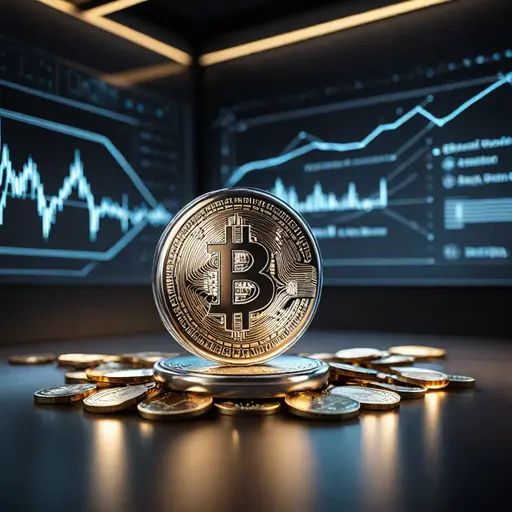Predictions for the Next Decade of Decentralized Finance

The world of decentralized finance (DeFi) has already made waves in the global financial landscape, but this is just the beginning. Over the next decade, DeFi is poised to revolutionize how we interact with money, investments, and markets. As blockchain technology matures and adoption grows, the possibilities for innovation are virtually limitless. In this article, we’ll explore key predictions for the future of DeFi, examining how it will reshape industries, empower individuals, and redefine the concept of trust in the financial ecosystem.
The Evolution of DeFi: A New Era of Financial Systems
From Niche to Mainstream Adoption
Over the past few years, DeFi has transitioned from a niche experiment to a cornerstone of the decentralized economy. However, its potential is far from fully realized. In the next decade, DeFi is expected to become a mainstream force, integrating seamlessly into everyday life. Traditional financial institutions will increasingly adopt blockchain -based systems to enhance efficiency, transparency, and accessibility.
One of the driving factors behind this shift will be the growing demand for inclusivity. Today’s centralized financial systems exclude billions of people worldwide due to geographic, economic, or regulatory barriers. DeFi eliminates these obstacles by offering open access to markets and services. Anyone with an internet connection can participate, regardless of location or socioeconomic status. This democratization of finance will play a pivotal role in bridging the gap between the banked and unbanked populations.
Interoperability Across Blockchains
As the DeFi ecosystem expands, interoperability will become a top priority. Currently, many DeFi platforms operate on isolated blockchain networks, limiting their ability to communicate and share data. Over the next decade, advancements in cross-chain technology will enable seamless interaction between different blockchains, creating a unified decentralized financial infrastructure.
This interoperability will unlock new opportunities for users and businesses alike. For example, individuals will be able to move assets across multiple markets without friction, while developers can build applications that leverage the strengths of various blockchains. Projects like Polkadot and Cosmos are already paving the way for this interconnected future, and their influence will only grow stronger.

Key Predictions for the Next Decade
The Rise of Decentralized Autonomous Organizations (DAOs)
Decentralized Autonomous Organizations (DAOs) will play a central role in shaping the future of DeFi. These community-driven entities operate without traditional hierarchies, relying instead on smart contracts and consensus mechanisms to make decisions. DAOs will enable users to collectively govern DeFi protocols, ensuring fairness and accountability.
In the coming years, DAOs will expand beyond governance to encompass a wide range of activities, including investment funds, insurance pools, and even charitable organizations. This shift will empower individuals to take control of their financial futures, fostering a more equitable distribution of wealth and resources.
Integration with Real-World Assets
While DeFi initially focused on digital assets like cryptocurrencies, the next decade will see a surge in the tokenization of real-world assets. Everything from real estate and commodities to intellectual property and stocks will be represented as tokens on blockchain networks. This process will unlock liquidity in traditionally illiquid markets, enabling fractional ownership and lowering barriers to entry.
For instance, imagine being able to invest in a fraction of a commercial property or a piece of art through a DeFi platform. Tokenization will not only broaden access to high-value assets but also reduce reliance on intermediaries such as brokers and custodians. This trend will blur the lines between traditional and decentralized financial systems, creating hybrid models that combine the best of both worlds.
Enhanced Regulatory Frameworks
As DeFi continues to gain traction, regulators around the world will develop clearer frameworks to address its unique challenges. While some may view regulation as a threat to decentralization, it could actually enhance trust and legitimacy within the market. Clear guidelines will encourage institutional investors to enter the space, bringing much-needed capital and stability.
However, striking the right balance will be crucial. Overregulation could stifle innovation, while underregulation might expose users to risks. The most successful jurisdictions will adopt flexible policies that prioritize consumer protection without stifling creativity. Platforms like DNS-PAY, which emphasize compliance and security, will thrive in this regulated environment.
AI and Machine Learning in DeFi
Artificial intelligence (AI) and machine learning (ML) will become integral components of DeFi over the next decade. These technologies will enhance risk management, optimize trading strategies, and improve user experiences. For example, AI-powered algorithms could analyze vast amounts of data to predict market trends, helping users make informed decisions.
Moreover, AI will streamline operations within DeFi platforms, automating tasks such as identity verification, fraud detection, and customer support. This automation will reduce costs and increase efficiency, making DeFi services more accessible to a broader audience.
Expansion of Decentralized Lending and Borrowing
Lending and borrowing are among the most popular use cases for DeFi, and this trend will accelerate in the coming years. Decentralized lending platforms will offer competitive interest rates, lower fees, and faster processing times compared to traditional banks. Users will no longer need to rely on credit scores or collateral requirements, as blockchain -based systems can assess risk using alternative metrics.
Additionally, innovative products such as flash loans—short-term, uncollateralized loans executed within a single transaction —will continue to evolve. These tools will empower entrepreneurs and developers to create groundbreaking applications, further expanding the utility of DeFi.
Growth of Decentralized Insurance
Insurance is another area ripe for disruption by DeFi. Traditional insurance providers often suffer from inefficiencies, high premiums, and lengthy claims processes. Decentralized insurance platforms will address these issues by leveraging smart contracts to automate payouts and reduce overhead costs.
Over the next decade, we’ll see the emergence of parametric insurance products, where claims are triggered automatically based on predefined conditions. For example, if a flight is delayed, policyholders could receive compensation instantly without filing a claim. This innovation will make insurance more affordable and transparent, benefiting consumers and businesses alike.
Challenges and Opportunities Ahead
While the future of DeFi is bright, it’s important to acknowledge the challenges that lie ahead. Scalability remains a significant hurdle, as many blockchain networks struggle to handle high volumes of transactions during peak periods. Solutions like layer-2 scaling and sharding will address these limitations, but widespread adoption will take time.
Security is another critical concern. Despite advances in encryption and smart contract auditing, DeFi platforms remain vulnerable to hacks and exploits. Continuous innovation in cybersecurity will be essential to protect users’ funds and maintain trust in the ecosystem.
Despite these challenges, the opportunities far outweigh the risks. The decentralized financial revolution promises to create a more inclusive, efficient, and transparent global economy. By embracing DeFi, individuals and businesses can unlock unprecedented levels of freedom and flexibility.
The next decade will be transformative for decentralized finance, reshaping industries and empowering millions of people worldwide. From the rise of DAOs and tokenized assets to enhanced regulation and AI integration, the DeFi landscape will evolve in ways we can only begin to imagine. At the heart of this revolution lies the promise of a truly decentralized and equitable financial system—one that prioritizes accessibility, transparency, and innovation.
If you’re ready to embrace the future of finance, consider partnering with DNS-PAY, a trusted provider of safe and reliable payment solutions worldwide. With a focus on cutting-edge technology and unwavering commitment to security, DNS-PAY ensures that your transactions remain seamless and protected.